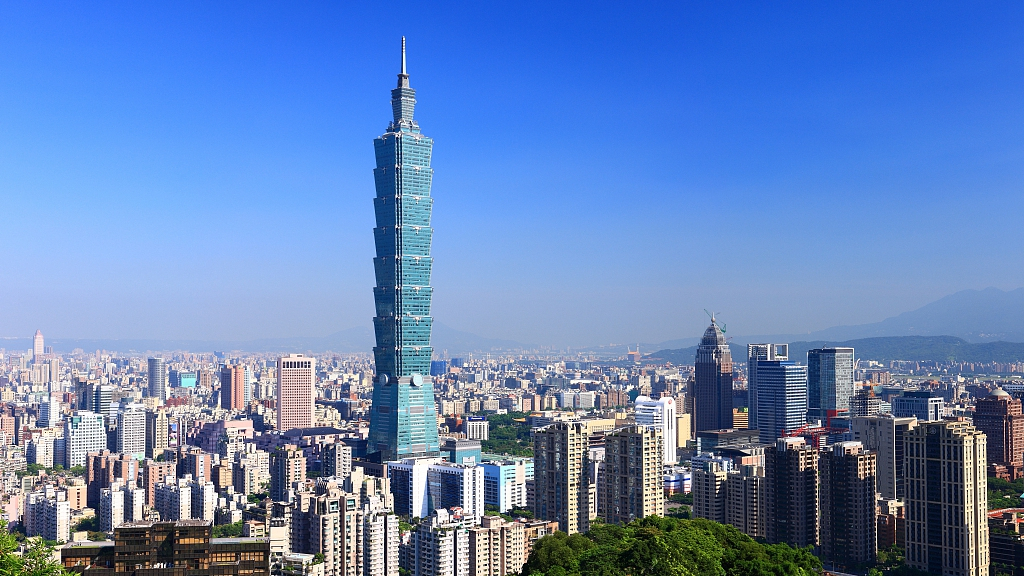
The Taipei 101 skyscraper commands the urban landscape in Taipei, southeast China's Taiwan. [Photo/Xinhua]
By John Gong
China has had enough of Lithuania's double-dealing. It downgraded its diplomatic relations with Vilnius days after Lithuania allowed Taiwan region to open a de facto embassy there. Lithuania's defense of its respect for the "one-China" policy is pale, hollow and utterly insincere. China will not be tossed up as a bargaining chip to solve someone else's problem.
Beneath Vilnius' pompous rhetoric about ideology and human rights lies a cold-blooded realist calculation driven by its national security consideration. That has to do with Russia's Kaliningrad area, which used to be East Prussia, but after the World War II became a part of the Soviet Union. When Lithuania became independent in 1990 before the collapse of the Soviet Union, Kaliningrad became an exclave that is entirely cut off from the rest of Russia. The land route between the two sides is mostly by a railway that runs through Belarus first and Lithuania next.
But Kaliningrad is particularly important strategically to Russia because it is the only port in western part of Russia that doesn't freeze in winter, and it is also where the Russian Baltic fleet is based. Kaliningrad essentially controls the waterway to the three Baltic states. On land, the Lithuania-Poland border, a narrow strip of land of about 110 kilometers between Kaliningrad and Belarus, also called the Suwalki Gap or the Suwalki Corridor, serves as the only gate to the larger NATO members' territory starting from Poland.
Lithuania feels insecure about this area, particularly after the Crimea issue in 2014 during the Ukraine crisis. A NATO internal report reveals its concern over the Russian military presence on the two sides of the Suwalki Gap, respectively in Kaliningrad and Belarus, as the military strength between Russia and the NATO is eight to one in Russia's favor. It says it needs to station 18 brigades there to counter Russia's dominance. But since 2017, the only NATO presence in Lithuania contains only one battalion stationed in Rukla and manned by German, Dutch and Czech forces in rotation.
Lithuania has been trying to entice American troops to be permanently stationed in Lithuania for some time. Today there are some American soldiers stationed in Pabrade, Lithuania, which is very near to Belarus. But this is still a rotational mission as a part of the NATO deployment.
Lithuania went out of its way to make Americans happy so they can stay permanently. Lithuanian Minister of National Defense Arvydas Anusauskas openly touted the 7 million-euro ($7.87 million) facility in Pabrade, which he said he hopes could be American GIs second home. In addition, Lithuania is also lobbying U.S. National Security Advisor Jake Sullivan through House Baltic Caucus chairman, Representative Don Bacon from Nebraska.
Lithuania understands that Washington's strategic focus is pivoting to the Indo-Pacific, manifestly targeting China, and the bigger context is the Sino-U.S. grand competition. So it takes an "opportune" approach to court Washington in ways appearing to be cooperative and helpful with America's strategy. Hence, one can see the overture to Taiwan authorities and the human right accusations with respect to Xinjiang Uygur Autonomous Region and Hong Kong Special Administrative Region.
But China will not be made a bargaining chip like that.
As Chinese Foreign Ministry spokesperson Zhao Lijian said, "Lithuania has got to where it is today obviously at the instigation of certain major country, but what has been hurt is Lithuania's own interests. The Lithuanian government must bear all the ensuing consequences."
In short, from now on, Vilnius may lose more than it can gain, and it should be prepared for the consequences.

 中文
中文



